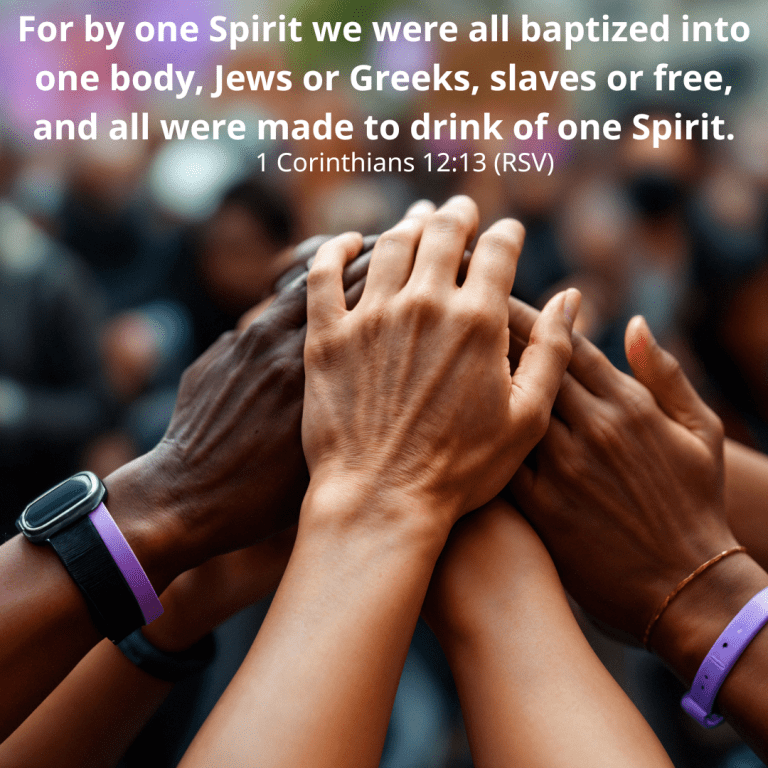
The Holy Spirit is not just an abstract concept or a mystical force; He is a personal and powerful presence in the life of every believer. Understanding His role and allowing Him to actively work in our lives is essential for spiritual growth and victorious Christian living. In this article, we will delve into the transformative influence of the Holy Spirit, supported by biblical narratives and reflections, and see how He continues to work in the lives of believers today.
1. The Holy Spirit as Our Guide
One of the most profound ways the Holy Spirit works in a believer’s life is by guiding us through the complexities of life. Jesus promised this guidance when He said:
John 16:13 (RSV) – “When the Spirit of truth comes, he will guide you into all the truth; for he will not speak on his own authority, but whatever he hears he will speak, and he will declare to you the things that are to come.”
Consider the story of Philip and the Ethiopian eunuch (Acts 8:26-40). Philip, led by the Spirit, approached the chariot and explained the Scriptures, resulting in the eunuch’s conversion and baptism. This narrative highlights how sensitive obedience to the Spirit’s guidance can lead to profound outcomes.
Today, believers can experience the Holy Spirit’s guidance in everyday decisions—whether in career choices, relationships, or ministry. Many testify of the Spirit’s prompting to reach out to someone in need or speak a word of encouragement at just the right moment.
2. The Spirit Who Empowers
The empowerment of the Holy Spirit is vividly portrayed at Pentecost. After Jesus’ ascension, the disciples were unsure and fearful. But when the Spirit descended upon them, they were transformed into bold witnesses.
Acts 1:8 (RSV) – “But you shall receive power when the Holy Spirit has come upon you; and you shall be my witnesses in Jerusalem and in all Judea and Samaria and to the end of the earth.”
Peter, who once denied Christ, boldly preached, leading to the conversion of about three thousand people (Acts 2:14-41). The Spirit’s power equips ordinary people to perform extraordinary acts of faith.
This empowerment is evident when believers boldly share their faith despite challenges or speak truth in situations where silence seems easier. The Spirit gives us courage to act according to God’s will.
3. The Spirit as Comforter
Life’s challenges can leave us weary and disheartened. The Holy Spirit, however, comes as a Comforter, assuring us of God’s presence in our pain.
John 14:16-17 (RSV) – “And I will pray the Father, and he will give you another Counselor, to be with you forever, even the Spirit of truth.”
When Paul faced persecution and hardship, he found comfort through the Spirit’s inner strengthening (2 Corinthians 1:3-5). This divine comfort enabled him to endure and continue his mission.
In modern life, believers find comfort when overwhelmed by grief, loss, or uncertainty. Through prayer and worship, the Holy Spirit brings peace that surpasses understanding, reminding us that we are never alone.
4. The Spirit of Transformation
Paul emphasizes the transformative work of the Holy Spirit in believers:
Romans 8:11 (RSV) – “If the Spirit of him who raised Jesus from the dead dwells in you, he who raised Christ Jesus from the dead will give life to your mortal bodies also through his Spirit which dwells in you.”
When the Spirit transforms a believer, old habits, sins, and weaknesses are replaced with new life, marked by the fruit of the Spirit (Galatians 5:22-23). This transformation is not instantaneous but a continual process as we yield to His work.
In today’s context, transformation might involve overcoming addiction, finding hope amidst despair, or growing in patience and love. Believers experience gradual yet profound change as they submit daily to the Spirit’s leading.
5. The Holy Spirit and Fellowship
Unity among believers is one of the key works of the Holy Spirit:
1 Corinthians 12:13 (RSV) – “For by one Spirit we were all baptized into one body—Jews or Greeks, slaves or free—and all were made to drink of one Spirit.”
The early church exemplified this unity. Despite differences in background and social status, they were of one heart and mind (Acts 4:32). The Holy Spirit cultivates a spirit of love and collaboration within the body of Christ.
In today’s diverse church communities, the Spirit continues to break down barriers of race, culture, and background, fostering unity and love among believers. Small groups, communal worship, and service projects often become places where the Spirit knits hearts together.
6. The Spirit of Intercession
One of the profound ways the Holy Spirit helps believers is through intercession. When we face situations where words fail us, the Spirit steps in, praying on our behalf.
Romans 8:26 (RSV) – “Likewise the Spirit helps us in our weakness; for we do not know how to pray as we ought, but the Spirit himself intercedes for us with sighs too deep for words.”
This powerful assurance means that even in moments of despair or confusion, when prayer seems impossible, the Holy Spirit prays for us according to the will of God. Modern believers often experience this in moments of deep worship or crisis when words are inadequate. Trusting that the Spirit intercedes brings comfort and peace.
7. The Spirit as the Giver of Spiritual Gifts
The Holy Spirit equips believers with spiritual gifts to build up the church and serve God effectively. These gifts are diverse, ranging from wisdom and knowledge to healing and prophecy.
1 Corinthians 12:4-7 (RSV) – “Now there are varieties of gifts, but the same Spirit; and there are varieties of service, but the same Lord; and there are varieties of working, but it is the same God who inspires them all in every one. To each is given the manifestation of the Spirit for the common good.”
Believers are encouraged to seek and develop their spiritual gifts, using them to serve others and glorify God. Whether in church leadership, creative ministries, or everyday acts of kindness, the Spirit empowers believers to make a difference.
Living by the Spirit
The Christian life is not merely about following rules but about being led by the Spirit. It requires daily surrender and openness to His leading. As we allow the Spirit to work within us, our lives bear witness to His power and grace. From guiding and comforting to empowering and transforming, the Holy Spirit is actively involved in every aspect of a believer’s journey.
Today, believers can cultivate sensitivity to the Spirit through prayer, meditation on Scripture, and staying connected to a faith community. As we walk in step with the Spirit, we reflect Christ’s love and power in a world in need of hope.

After the trauma of the crucifixion, the disciples were locked away, afraid, confused, and uncertain about what the future held. But on the evening of that first Easter Sunday, everything changed when Jesus stood among them and said:
“Peace be with you!” — John 20:19 (NIV)
These words were more than a greeting. They were a divine declaration: peace had triumphed over fear, and life had conquered death.
1. Peace That Calms Fear
The disciples were hiding behind locked doors, fearing for their lives. But the presence of Jesus shattered their fear.
“Then the disciples were glad when they saw the Lord.” — John 20:20 (NIV)
The Resurrection reminds us that no matter what we face—uncertainty, loss, danger—Jesus brings peace that surpasses our fear.
2. Peace That Comes from Reconciliation
The cross was not just about suffering; it was about reconciling humanity with God. Jesus’ resurrection is the seal of that reconciliation.
“Therefore, since we have been justified through faith, we have peace with God through our Lord Jesus Christ.” — Romans 5:1 (NIV)
We are no longer enemies of God. We are at peace with Him—fully forgiven and fully accepted.
3. Peace That Dwells Within
Jesus promised a peace that’s not dependent on circumstances but rooted in Him.
“Peace I leave with you; my peace I give you. I do not give to you as the world gives. Do not let your hearts be troubled and do not be afraid.” — John 14:27 (NIV)
This was a promise He fulfilled after rising from the grave. His peace becomes a permanent presence in our hearts.
4. Peace That Guards Our Minds
We are often bombarded with anxious thoughts. But resurrection peace acts like a shield.
“And the peace of God, which transcends all understanding, will guard your hearts and your minds in Christ Jesus.” — Philippians 4:7 (NIV)
God’s peace doesn’t always change our situation, but it changes us in the midst of it.
5. Peace That Leads to Purpose
In John 20:21, Jesus repeats, “Peace be with you!” and then says:
“As the Father has sent me, I am sending you.”
Peace isn’t just for comfort—it’s preparation for mission. We are sent out as ambassadors of this peace to a world that desperately needs it.
6. Peace Through the Holy Spirit
Jesus breathed on them and said:
“Receive the Holy Spirit.” — John 20:22 (NIV)
The Holy Spirit becomes the continual source of peace, power, and presence in our lives. It is the Spirit that produces peace as fruit within us:
“But the fruit of the Spirit is love, joy, peace…” — Galatians 5:22 (NIV)
7. Peace in a Troubled World
We live in a world that is anything but peaceful. But the resurrection gives us hope beyond this life.
“I have told you these things, so that in me you may have peace. In this world you will have trouble. But take heart! I have overcome the world.” — John 16:33 (NIV)
The risen Christ gives us a durable peace—one that holds even in chaos, grief, or conflict.
Final Thoughts
Jesus didn’t wait for perfect conditions to bring peace. He entered a locked room, full of fear, and filled it with His presence. Today, He still does the same.
Resurrection peace is not passive, it’s powerful, purposeful, and personal.
Will you let His peace rule in your heart today?

The season of love is a time to reflect on stories of deep, enduring affection. While many love stories focus on romance alone, the story of Priscilla and Aquila in the Bible showcases a love built on faith, purpose, and shared ministry. Their relationship was not just about companionship; it was a divine partnership that impacted the early Church.
Love in Exile: A Journey Together
Priscilla and Aquila first appear in Scripture as Jewish tentmakers who had been forced to leave Rome due to Emperor Claudius’ decree. In Acts 18:2, Paul meets them in Corinth:
“There he met a Jew named Aquila, a native of Pontus, who had recently come from Italy with his wife Priscilla, because Claudius had ordered all Jews to leave Rome. Paul went to see them.” (Acts 18:2, NIV)
Despite their displacement, they remained together, demonstrating resilience through life’s challenges. Their love was not just for each other but for the work God had set before them.
A Love That Serves
Not only were they devoted to one another, but they were also deeply committed to God’s work. When Paul arrived in Corinth, he stayed with them and worked alongside them as a tentmaker (Acts 18:3). Their hospitality and willingness to serve made them an essential part of Paul’s ministry.
“And because he was a tentmaker as they were, he stayed and worked with them.” (Acts 18:3, NIV)
Priscilla and Aquila opened their home, not only to Paul but to many believers, turning it into a hub for ministry. Their love was one that served—both each other and the Church.
A Love That Teaches
One of the most beautiful aspects of their relationship was their shared commitment to discipleship. In Acts 18:24-26, they encountered Apollos, a gifted speaker who lacked a full understanding of the gospel. Instead of criticizing him publicly, they took him aside and taught him more accurately:
“He began to speak boldly in the synagogue. When Priscilla and Aquila heard him, they invited him to their home and explained to him the way of God more adequately.” (Acts 18:26, NIV)
Their love was not selfish—it extended to mentoring and nurturing others in the faith. They worked as a team, showing that ministry can be stronger when done together.
A Love That Risks Everything
Priscilla and Aquila were not only teachers and hosts—they were courageous. In Romans 16:3-4, Paul acknowledges them as fellow workers who risked their lives for him:
“Greet Priscilla and Aquila, my co-workers in Christ Jesus. They risked their lives for me. Not only I but all the churches of the Gentiles are grateful to them.” (Romans 16:3-4, NIV)
Their love was sacrificial, willing to endure hardship and danger for the sake of the gospel. They stood side by side, not just in daily life, but in moments of great risk.
A Love That Builds the Church
Beyond their personal relationship, Priscilla and Aquila were dedicated to strengthening the Church. In 1 Corinthians 16:19, Paul mentions how the church met in their home:
“The churches in the province of Asia send you greetings. Aquila and Priscilla greet you warmly in the Lord, and so does the church that meets at their house.” (1 Corinthians 16:19, NIV)
Their home was not just a place of rest—it was a sanctuary for believers. Together, they created an atmosphere where faith could flourish.
A Love That Lasts
The final mention of them in 2 Timothy 4:19 shows that, years later, they were still serving the Lord:
“Greet Priscilla and Aquila and the household of Onesiphorus.” (2 Timothy 4:19, NIV)
Even in later years, their love for each other and for God’s work remained steadfast.
Conclusion
Priscilla and Aquila’s story is not just about romance, it’s about a partnership that glorifies God. Their love was deeply rooted in faith, service, and mission. This Valentine’s season, may their story inspire us to pursue relationships that are built not just on emotions, but on a shared commitment to something greater.
Would you like to cultivate a love that lasts? Follow their example, serve together, grow together, and keep God at the center of your love story.

Love and relationships are important aspects of life, especially for younger generations navigating friendships, family dynamics, dating, and social connections. In a world where love is often portrayed in a confusing, fleeting, or superficial way, the Bible offers clear and timeless wisdom on what love truly means and how to build healthy relationships.
Here are seven Bible verses that will help guide you through the complexities of love and relationships.
1. 1 Corinthians 13:4-7 — “Love is patient, love is kind. It does not envy, it does not boast, it is not proud. It does not dishonor others, it is not self-seeking, it is not easily angered, it keeps no record of wrongs. Love does not delight in evil but rejoices with the truth. It always protects, always trusts, always hopes, always perseveres.”
In a world that sometimes focuses on instant gratification and fleeting emotions, the Bible reminds us that love is more about giving than receiving. Love isn’t just a feeling; it’s a choice to act with kindness and humility, even when it’s hard.
2. Matthew 22:37-39 — “Jesus replied: ‘Love the Lord your God with all your heart and with all your soul and with all your mind.’ This is the first and greatest commandment. And the second is like it: ‘Love your neighbor as yourself.’”
Jesus simplifies love and relationships into two commandments: loving God first and then loving others. When your relationships are rooted in love for God, they will naturally reflect a love that values and respects others.
3. Proverbs 17:17 — “A friend loves at all times, and a brother is born for a time of adversity.”
Friendships and community are crucial, especially for the younger generation navigating through life’s challenges. Genuine friends love in every season, not just when it’s easy or convenient. They are there to support you during difficult times, and they offer strength and encouragement when you need it most.
4. 1 John 4:18 — “There is no fear in love. But perfect love drives out fear, because fear has to do with punishment. The one who fears is not made perfect in love.”
Many young people experience anxiety, fear, or insecurity in relationships, whether it’s fear of rejection, fear of not being enough, or fear of vulnerability. But this verse reminds us that real love, the kind of love God gives, casts out fear. In healthy relationships, love should create a sense of safety, not fear or insecurity. When you’re in a relationship that reflects God’s love, you will feel valued and cherished, not afraid or anxious.
5. Ephesians 4:2-3 — “Be completely humble and gentle; be patient, bearing with one another in love. Make every effort to keep the unity of the Spirit through the bond of peace.”
In a world where arguments and conflict are common, these verses from Ephesians encourage us to practice humility, patience, and unity in our relationships. It’s not always easy, but maintaining peace and working toward understanding are key aspects of healthy connections. Love isn’t about always being right; sometimes it’s about listening, understanding, and choosing peace over conflict.
6. Song of Solomon 8:4 — “Do not arouse or awaken love until it so desires.”
For young people, particularly in the context of dating and romantic relationships, this verse offers wisdom about timing and patience. Culture often pressures young people to rush into relationships or equates physical attraction with love. However, the Bible encourages us to wait for the right timing, to allow love to grow naturally and genuinely, without rushing into anything prematurely. This ensures that relationships are based on genuine connection and mutual respect.
7. Romans 12:10 — “Be devoted to one another in love. Honor one another above yourselves.”
Instead of asking, “What can I get out of this relationship?” we are encouraged to honor and respect others, putting their needs ahead of our own. True love is about devotion and commitment, not just convenience or personal gain. When you prioritize honoring others, you build relationships that are strong, meaningful, and lasting.
Conclusion
Navigating love and relationships as a young person can be challenging, especially in a world filled with mixed messages about what love is and how relationships should work. However, these Bible verses provide a clear and countercultural view of love: one that is selfless, patient, kind, and enduring. Love isn’t just about feelings, it’s about action, commitment, and putting others before yourself. When your relationships are rooted in these principles, they will flourish in ways that bring fulfillment, joy, and peace. So, take these truths with you as you navigate love and relationships, always remembering that God’s love is the foundation of all healthy connections.

Prayer is a vital aspect of the Christian faith, serving as a direct line of communication with God. The Bible offers numerous verses that can guide and inspire us in our prayer life. Here are seven Bible verses that can help you to pray:
1. Matthew 6:9-13
“This, then, is how you should pray: ‘Our Father in heaven, hallowed be your name, your kingdom come, your will be done, on earth as it is in heaven. Give us today our daily bread. And forgive us our debts, as we also have forgiven our debtors. And lead us not into temptation, but deliver us from the evil one.’”
The Lord’s Prayer, provides a perfect model for prayer. It includes elements of praise, submission to God’s will, requests for daily needs, forgiveness, and guidance. Using this structure can help us cover all aspects of our spiritual life in prayer.
2. Philippians 4:6
“Do not be anxious about anything, but in every situation, by prayer and petition, with thanksgiving, present your requests to God.”
You are encouraged to turn your worries into prayers. This verse emphasizes importance of approaching God with your needs and anxieties, coupled with a heart of gratitude. This verse reminds you that prayer is a means to relieve anxiety and to trust in God’s provision.
3. 1 Thessalonians 5:16
“Rejoice always, pray continually, give thanks in all circumstances; for this is God’s will for you in Christ Jesus.”
Praying continually doesn’t mean being on our knees all day but maintaining a constant awareness of God’s presence and turning to Him throughout our day. It encourages an attitude of gratitude and joy in all circumstances.
4. James 5:16
“Therefore confess your sins to each other and pray for each other so that you may be healed. The prayer of a righteous person is powerful and effective.”
James 5:16 emphasizes the power of communal prayer and confession. It encourages us to support each other through prayer and to recognize the importance of a righteous person’s prayer. You are encouraged to seek out prayer partners and to be diligent in your intercessions for others.
5. Romans 8:26
“In the same way, the Spirit helps us in our weakness. We do not know what we ought to pray for, but the Spirit himself intercedes for us through wordless groans.”
You can find comfort in knowing that the Holy Spirit assists you in your prayers, especially when you are uncertain about what to pray for. The Spirit’s intercession ensures that your prayers align with God’s will, providing a deeper connection in your communication with God.
6. Matthew 7:7-8
“Ask and it will be given to you; seek and you will find; knock and the door will be opened to you. For everyone who asks receives; the one who seeks finds; and to the one who knocks, the door will be opened.”
Jesus assures you that your earnest seeking and asking will not go unanswered. This promise can bolster your confidence in approaching God with your needs and desires, knowing that He listens and responds.
7. 1 John 5:14-15
“This is the confidence we have in approaching God: that if we ask anything according to his will, he hears us. And if we know that he hears us—whatever we ask—we know that we have what we asked of him.”
God is attentive to your prayers. It highlights the importance of aligning your requests with His will, giving you confidence that your prayers are heard and will be answered in accordance with His divine plan.
Conclusion
Prayer is a powerful and essential practice in the Christian life. These seven Bible verses offer guidance, encouragement, and assurance in our prayer journey. By meditating on and incorporating these scriptures into your prayer life, you can deepen your relationship with God, approach Him with confidence, and experience the transformative power of prayer.

Unity is a fundamental principle deeply rooted in the Bible, emphasizing the strength, harmony, and spiritual growth that comes from being united in faith and purpose. Here are seven powerful Bible verses that highlight the importance of unity and the divine blessings that flow from it.
1. Psalm 133:1
“How good and pleasant it is when God’s people live together in unity!”
Unity among God’s people is seen as something good and pleasing, reflecting God’s desire for His followers to live in peace and mutual support.
2. John 17:22
I have given them the glory that you gave me, that they may be one as we are one.
Jesus emphasizes the importance of unity among His followers. He prays for believers to be united just as He is with the Father.
3. Ephesians 4:3
“Make every effort to keep the unity of the Spirit through the bond of peace.”
We are all part of one body with one hope, one Lord, one faith, and one God. We should therefore preserve this unity.
4. 1 Corinthians 1:10
“I appeal to you, brothers and sisters, in the name of our Lord Jesus Christ, that all of you agree with one another in what you say and that there be no divisions among you, but that you be perfectly united in mind and thought.”
God does not like divisions. Unity is essential for presenting a cohesive and powerful witness to the world.
5. Colossians 3:14
“And over all these virtues put on love, which binds them all together in perfect unity.”
Love is identified as the ultimate virtue that holds everything together in perfect unity.
6. Romans 12:5
So in Christ we, though many, form one body, and each member belongs to all the others.”
Unity in diversity means each one is important in their own way and we need each other in every way.
7. Philippians 2:2
Then make my joy complete by being like-minded, having the same love, being one in spirit and of one mind.”
Unity brings joy and completeness. We are all encouraged to cultivate a peaceful and loving community.

Do you know God’s grace? Here are 7 Bible verses to inspire you to understand this grace.
- Romans 3:23-24 for all have sinned and fall short of the glory of God, and are justified by his grace as a gift, through the redemption that is in Christ Jesus
To understand God’s grace, we have to acknowledge that we have done what is wrong in God’s eyes. We have sinned. We are in need of forgiveness and redemption.
- Ephesians 2:8-9 For by grace you have been saved through faith. And this is not your own doing; it is the gift of God, not a result of works, so that no one may boast.
God’s grace is a free gift that doesn’t depend on any good deeds you have done. God’s grace is for all who believe in Jesus Christ.
- James 4:6-7 But he gives more grace. Therefore it says, “God opposes the proud but gives grace to the humble.” Submit yourselves therefore to God. Resist the devil, and he will flee from you.
In humility we turn to God and confess that we have done wrong. In humility we receive God’s grace and he will lift us up.
- John 1:14 And the Word became flesh and dwelt among us, and we have seen his glory, glory as of the only Son from the Father, full of grace and truth.
God isn’t a distant God. He came to us and lived among us as one of us. Jesus is full of grace and truth.
- Hebrews 4:15-16 For we do not have a high priest who is unable to sympathize with our weaknesses, but one who in every respect has been tempted as we are, yet without sin. Let us then with confidence draw near to the throne of grace, that we may receive mercy and find grace to help in time of need.
You can come to Jesus, just as you are. He knows our weaknesses. Because of the grace of God, we are forgiven our sins.
- Titus 3:4-7 But when the goodness and loving kindness of God our Savior appeared, he saved us, not because of works done by us in righteousness, but according to his own mercy, by the washing of regeneration and renewal of the Holy Spirit, whom he poured out on us richly through Jesus Christ our Savior, so that being justified by his grace we might become heirs according to the hope of eternal life.
We don’t earn or deserve God’s grace by our good deeds, but it’s given according to God’s own mercy. By grace we are saved through our faith and even become heirs to the kingdom of God.
- Revelation 22:21 The grace of the Lord Jesus be with all. Amen.
This is the very last verse of the Bible and it reminds and expresses the wish for God’s grace be with you. “Amen” means “surely”, “truly” or “so be it.” We live by the hope and trust in God’s grace every day.
